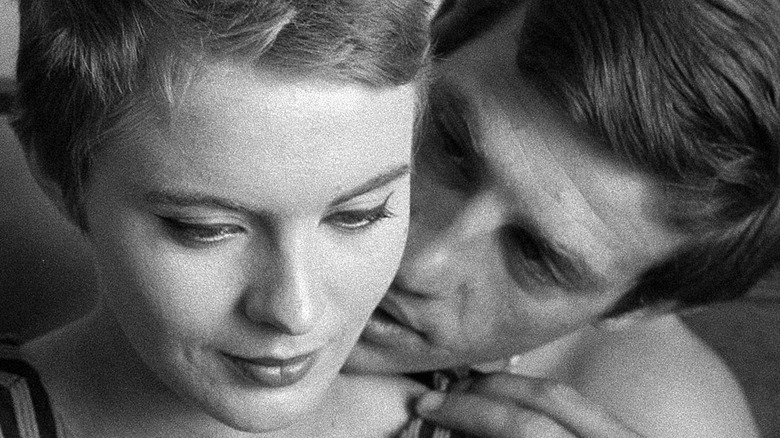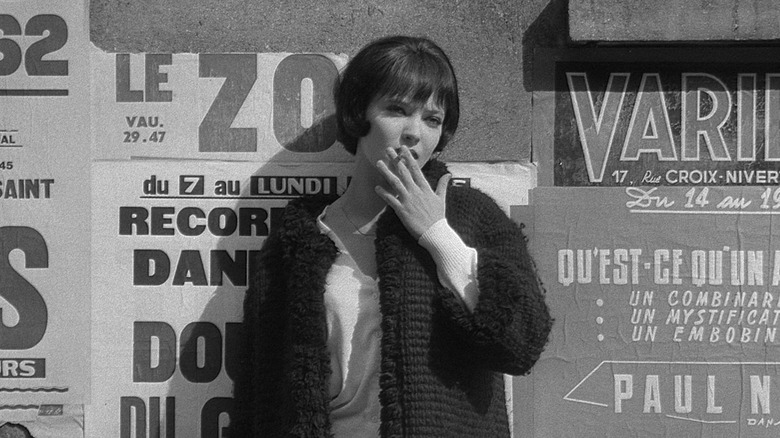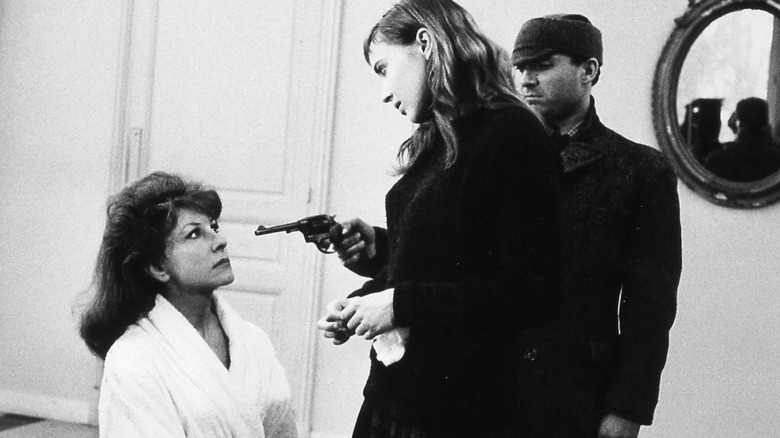How Jean-Luc Godard Went From Playful Critic To Film School Staple
Jean-Luc Godard passed away on September 13, 2022 at the age of 91. In a vast and prolific career that spanned seven decades (Godard directed his first feature in 1955, his most recent in 2018) Godard never once shied away from confrontation. Godard was a film brat of the highest order, who used his early New Wave films as a playful, somewhat bitter commentary on the insidious infiltration of cinematic images into our minds. His most celebrated film, "Breathless" (1960), takes place in a world where characters have internalized an ineffable sense of "cool" they learned directly from American movies; in one scene, Jean-Paul Belmondo, sporting a fedora and cigarette, spends a moment to look at a headshot of Humphrey Bogart, a photo he seems to regard like a mirror.
Much hay has been made by talented and insightful essayists over the impact Godard has had on modern filmmaking. He made movies about people who lived in movies. He was of a generation of French filmmakers who was raised in movie houses stuffed with Hollywood classics, international imports, and local filmmakers that Godard likely knew personally. Godard and his peers were also critics prior to being filmmakers — Godard wrote for the tragically shuttered Cahiers du Cinéma — and their works typcially stood as commentaries on other movies. If one watches French New Wave films in the order of their release, one might see a snarky, jibe-ridden conversation emerge. "You think car crashes are trite? I'll give you trite!"
As such, any film wherein characters discuss movies — or who seem to have based their entire personalities around pre-existing movie personalities — are children of Godard. "Slacker," "Reservoir Dogs," "Clerks," and "Scream" are the self-aware descendants of "Breathless."
Sir Godard the Pretentious
Of course, understanding the "joke" of the French New Wave, and becoming privy to the conversation would eventually brand Godard — in American films schools — as being painfully pretentious. Indeed, going through the entirety of Godard's filmography, one will find example after example of the filmmaker confronting one tired convention or another. In "La Petit Soldat" (made in '60, released in '63), Godard confronted the wisdom of a war in progress, and, by extension, cinema's habit of glorifying war overall. If a viewer is savvy to politics and filmmaking trends around the times Godard made a movie, one will find that he was incredibly reactionary, and that his movies serve as criticism.
As time passed, Godard movies seemed to require more and more study to be understood. Some of his more recent films — 2014's "Goodbye to Language" springs immediately to mind, as does 2004's "Notre Musique" — are so oblique as to be obnoxious. As such, Godard garnered a reputation — at least in film schools — for being "too arty" or "too difficult."
The irony is, Godard was a punk.
Godard was an adherent to the glorious counterculture axiom to subvert the dominant paradigm. Boy howdy, there was no paradigm he didn't want to subvert. One can see Godard's confrontational attitudes take shape in his early Cahier writings, wherein he frequently spoke out against modern film's tendency to provide comfort and clarity and ease of consumption for a complacent audience. Godard sought to rattle, to tear down, to raise a middle finger. He wasn't a classicist who sought to build out cinematic formalism. He was an idle youth with a sledgehammer.
The brain and not the heart
I'm reminded of a cute story about the filmmakers Wes Craven and Sam Raimi. In 1977, Craven included a ripped "Jaws" poster in his gritty survivalist horror movie "The Hills Have Eyes." The comment was that "Jaws" was Hollywood horror, and his film was the real thing. Sam Raimi, not to be outdone, included a ripped "The Hills Have Eyes" poster in the background of his 1981 film "The Evil Dead." To nod back, Craven included a scene from "The Evil Dead" in his 1984 film "A Nightmare on Elm Street," showing that Raimi's film is little more than late-night TV shlock. In turn, Raimi included a cameo from Freddy Krueger's glove in his 1987 film "Evil Dead 2: Dead By Dawn."
Two horror filmmakers kind of playing with one another. You love to see it.
Godard often played similar games with his contemporaries. His "Breathless" was a reaction to the success of his fellow Cahiers critics François Truffaut and Alain Resnais, who had already turned to filmmaking as their chosen critical medium. Joining in were other vital voices belonging to Agnès Varda, Jacques Rivette, and Jacques Demy. Unlike the Raimi/Craven interplay, though, Godard's references often remained in his own head. He would make references that only he understood and call out certain foibles of language and politics that he deliberately explained poorly. He was content to keep his audiences off-balance. Unlike Truffaut and Resnais and Varda and Rivette and Demy, Godard remained wholly in the realm of the intellect. His films were made for the brain, and not the heart.
Take back the subversion
What we know for sure is that Godard felt much contempt. In his 1967 film "Weekend," the hero says that "This is a lousy movie. All you meet are sick people," presumably offering a review of "Weekend" from within. "Weekend" was perhaps Godard's final attempt at being at all readable by a contemporary audience, and his films thereafter became nigh impossible. Part of being a Godard fan was being frustrated by, and even hateful of, his work.
Words like "experimental" and "avant-garde" began to crop up in essays about his work, and reviews became decidedly mixed. His reputation was sealed. Of the New Wave filmmakers, Godard was the "difficult" one. The one you dreaded watching.
The ultimate irony, is that Godard, even into his 90s, was playing a young man's game. He was dissatisfied. He wanted to tear down conventions. He wanted to assure that an audience kept their minds open to broad cinematic possibilities. He wanted to piss people off. Godard was not some lazy nihilist in a black turtleneck expounding on Marxism and the meaning of modern, tech-dominated life — those were his characters. Godard was a lively wrecking ball.
Godard may have a reputation for making brainy, mannered, inscrutable movies, but his work remains so much more alive than that. Godard's body of work is a constantly shifting and active argument against the establishment. In the 2010s, Godard was still fighting the Man, man. In an over-commercialized cinema world, voices like that should be cherished.



